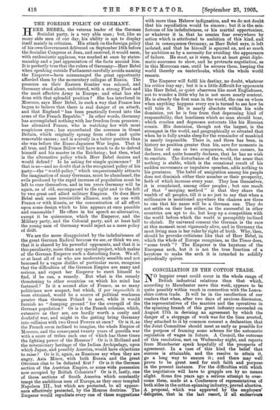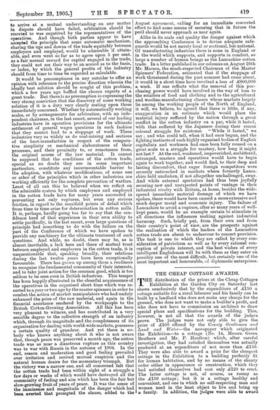N O happier event could occur in the whole range of
British industrial relations than that which, according to Manchester news this week, appears to be quite possibly within reach in connection with the Lanca- shire cotton trade. It will be in the recollection of our readers that when, after two days of anxious discussion, the representatives of the masters and the operatives in the spinning branch of this great industry succeeded on August 17th in devising an agreement by which the danger of a stoppage of work was for the time averted, they attached to it by common consent a declaration that the Joint Committee should meet as early as possible for the purpose of framing some scheme for the automatic regulation of wages in future. A Council, the outcome of this resolution, met on Wednesday night, and reports from Manchester speak hopefully of the prospects of agreement. In a case of this kind the belief that success is attainable, and the resolve to attain it, go a long way to ensure it ; and there may well prove to be great need for such faith and purpose in the present instance. For the difficulties with which the negotiators will have to grapple are by no means slight. Some five years ago a serious attempt to over- come them, made at a Conference of representatives 'of both sides in the cotton-spinning industry, proved abortive. A proposal, which was approved by the employers' delegates, that in the last resort, if all endeavours to arrive at a mutual understanding, on any matter in dispute should have failed, arbitration should be resorted to was negatived by the representatives of the operatives. And though both parties appear to have accepted the principle that some automatic mechanism, sharing the ups and downs of the trade equitably between employers and employed, would. be admirable if attain- able, and even went so far as to agree upon 5 per cent. as a fair normal reward for capital engaged in the trade, they could not see their way to an accord as to the basis, or index, by which the general profits of the industry should from time to time be regarded as calculable.
It would be presumptuous in any outsider to offer an opinion with reference to the precise direction wherein the ideally best solution should be sought of this problem, which a few years ago baffled. the chosen experts of a great trade. But there is no presumption in expressing the very strong conviction that the discovery of some working solution of it is a duty very clearly resting upon those immediately concerned. Whether by automatically working scales, or by arrangements for arbitration, with an inde- pendent chairman, in the last resort, several of our leading industries have in operation provisions for the ultimate settlement of general wages questions in such fashion that they cannot lead to a stoppage of work. These industries vary as widely as do coal-mining and sections of the boot-manufacture in respect of the compara- tive simplicity or mechanical elaborateness of their processes, and their proximity to, or remoteness from, the original source of the raw material. It cannot be supposed that the conditions of the cotton trade, special as no doubt they are in some important particulars, constitute any insurmountable barrier to the adoption, with whatever modifications, of some one or other of the principles which in other industries are working efficiently for the complete prevention of warfare. Least of all can this be believed when we reflect on the admirable system by which employers and employed in the cotton trade have for many years succeeded. in preventing not only ruptures, but even any serious friction, in regard to the manifold points of detail which from time to time arise for determination in cotton mills. It is, perhaps, hardly going too far to say that the con- fidence bred of that experience in their own ability to settle pacifically, in the last resort, even large questions of principle had something to do with the failure on the part of the Conference of which we have spoken to provide any machinery for the ultimate treatment of such questions. And while, no doubt, there may be, as is almost inevitable, a lack here and there of mutual trust between employed and employers in the cotton trade, it is unquestionable that, speaking broadly, their relations during the last twelve years have been exceptionally favourable. There has grown up among them a readiness to recognise the fundamental community of their interests, and to take joint action for the common good, which is too seldom to be seen even in British industries. This temper has been happily illustrated in the cheerful acquiescence of the operatives in the organised short time which was re- sorted to a year or two ago by the master spinners in order to combat the action of market manipulators who had unduly enhanced the price of the raw material, and again in the financial assistance rendered by the workpeople to the British Cotton-Growing Association. All this has been very pleasant to witness, and has contributed in a very sensible degree to the collective strength of an industry which, through its magnitude and the completeness of its organisation for dealing with world-wide markets, possesses a certain quality of grandeur. And yet there is no- body who knows anything about it who is not aware that, though peace was preserved a month ago, the cotton trade was as near a disastrous rupture as this country was to war with Russia in the autumn of 1904. In the end, reason and moderation and good feeling prevailed over irritation and revived mutual suspicion and the natural human desire for the momentary triumph. But the victory was a narrow one, and all concerned felt that the cotton trade had been within sight of a struggle a few days or weeks of which would have destroyed all the community of feeling and aim which has been the fair but slow-growing fruit of years of peace. It was the sense of the imminence and magnitude of the danger which had been averted that prompted the clause, added to - the August agreement, calling for an immediate concerted effort to find some means of securing that in future the peril should never approach as near again.
Alike in its scale and quality the danger against which the approachine. Conference is to devise adequate safe- guards would be not merely local or sectional, but national. Of manufacturing industries there is none in England or in the world which supports, and supports in comfort, so large a number of human beings as the Lancashire cotton trade. In a letter published in our columns on August 26th Mr. Macara, the much-respected Chairman of the Master Spinners' Federation, estimated that if the stoppage of work threatened during the past summer had come about, it would in a short time have involved a loss of £800,000 a week. If one reflects what the removal of this pur- chasing power would have involved in the way of loss to the retailers of food and clothing and to the agricultural and woollen-manufacturing classes whose markets largely lie among the working people of the North of England, it will, we believe, be agreed that there is little, if any, exaggeration in an estimate which would place the material injury suffered by the nation through a great conflict in the cotton industry on a par, while it lasted, with that suffered by the Japanese during their recent colossal struggle for existence. " While it lasted," we say ; and who could tell, when it had once begun, and the fighting instincts of such highly organised bodies of English capitalists and workmen had once been fully roused on a great scale to a struggle for mastery, how long it might not last ? At the end, weakened, impoverished, embittered, estranged, masters and operatives would have to begin again to work together, and would find, to their deep and lasting discomfort, that eager foreign competitors were securely entrenched in markets where formerly Lanca- shire held unshaken, if not altogether unchallenged, sway. And while external spectators had thus been joyfully securing new and unexpected points of vantage in their industrial rivalry with Britain, at home, besides the wide- spread immediate material damage of which we have spoken, there would have been caused a more extensive and much deeper moral and economic injury. The failure of Lancashire to avoid a rupture, after so many years of well- kept peace, would be an example certain to stimulate in all directions the influences making against industrial harmony. Such, briefly put, from their own and from their country's point of view, are the prospects against the realisation of which the leaders of the Lancashire cotton trade are about to endeavour to concert provision. The task is one to which they are called by every con- sideration of patriotism as well as by every rational con- ception of private interest, and the best wishes of every intelligent Englishman will be with them as they enter on. possibly one of the most difficult, but certainly one of the most important and honourable, of diplomatic enterprises.











































 Previous page
Previous page